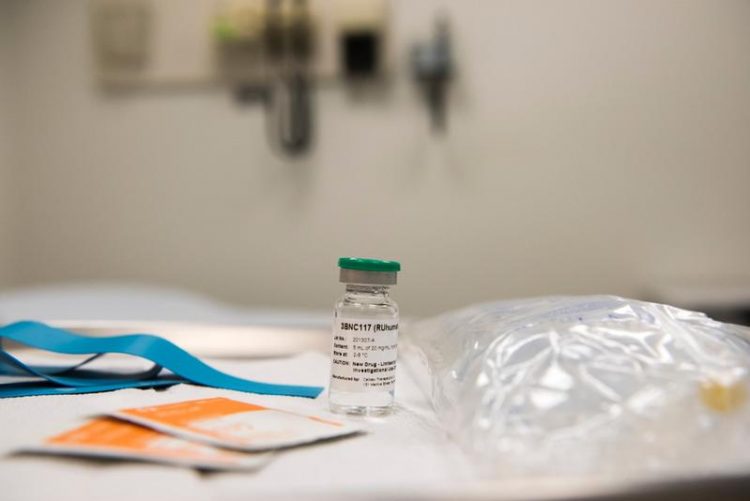Fighting HIV with antibodies

Fighting HIV with Antibodies Zach Veilleux, Rockefeller University
An international team of scientists, in collaboration with the German Center for Infection Research (DZIF) and the University Hospital of Cologne, has now tested a new generation of antibodies in humans for the first time. They have demonstrated that these broadly neutralising antibodies significantly reduce the number of human immunodeficiency viruses (HIV) in infected patients’ blood. The results have been published in the renowned journal Nature.
Today, HIV infections can be well controlled with a combination of different antiviral drugs. However, the drugs can cause some severe side effects, are expensive and have to be taken over a lifetime. Additionally, resistance can develop, which challenges individual treatment. “This is why we still need new treatment options,” explains Cologne infectious diseases specialist Prof Gerd Fätkenheuer, who is researching new ways of treating and preventing AIDS at the German Center for Infection Research.
In the trial, published today in Nature, doctors from the University Hospital of Cologne together with researchers of Michel Nussenzweig’s Laboratory from Rockefeller University in New York (USA) investigated a new treatment approach. For the first time, the scientists conducted human trials with an antibody (3BNC117), which was developed previously in Nussenzweig laboratory.
The special thing about this antibody is its ability to neutralise a large number of different human immunodeficiency viruses effectively. In the trial, which was co-funded by the DZIF, the antibody showed good tolerability and favourable pharmacological properties.
Furthermore, patients undergoing treatment at the highest dose level (30 mg per kg of bodyweight) showed a significant drop in viral load. “With this, the antibody has a potency comparable to the drugs we are currently using for treatment,” Fätkenheuer explains. The treatment effects could be observed for up to 28 days after administration of the antibodies.
The trial consequently opens up a new field in HIV treatment. Co-First Author Prof Florian Klein, who will soon be changing from the Rockefeller University to the University Hospital of Cologne, sees particular potential in the mechanism of action of broadly neutralising antibodies: “Neutralising antibodies have a different mechanism of action and different pharmacological properties compared to the HIV drugs that have been used up to now.”
According to the scientists, “Neutralising antibodies could play an important role in HIV treatment and HIV prevention.” Plans for clinical trials investigating the efficacy of broadly neutralising antibodies with regard to curing HIV are currently underway.
Current publication
Caskey, M.*; Klein, F.*(*Co-First Authors); Lorenzi, J.C.C.; Seaman, M.S.; West, A.P., Jr, Buckley, N.; Kremer, G.; Nogueira, L.; Braunschweig, M.; Scheid, J.F.; Horwitz, J. A.; Shimeliovich, I.; Avraham-Shulman, S.B.; Witmer-Pack, M.; Platten, M., Lehmann, C.; Burke, L.A.; Hawthorne, T.; Gorelick, R.J.; Walker, B.D.; Keler, T.; Gulick, R.M., Fätkenheuer, G.; Schlesinger, S.J.; Nussenzweig, M.C.:
Viraemia suppressed in HIV-1-infected humans by broadly neutralizing antibody 3BNC117
Nature, online first released on April 08 (2015)
DOI: 10.1038/nature14411
Contact
Prof Gerd Fätkenheuer
E-mail: g.faetkenheuer@uni-koeln.de
Prof Florian Klein
T +12123278367 /Mobile +17182900235
E-mail: fklein@rockefeller.edu
DZIF Press Office
Karola Neubert and Janna Schmidt
T +49531-6181-1170/1154
E-mail: presse@dzif.de
Press Office University Hospital of Cologne
Christoph Wanko
T +49221-478-88757
E-mail: Christoph.wanko@uk-koeln.de
Media Contact
More Information:
http://www.uk-koeln.de/All latest news from the category: Health and Medicine
This subject area encompasses research and studies in the field of human medicine.
Among the wide-ranging list of topics covered here are anesthesiology, anatomy, surgery, human genetics, hygiene and environmental medicine, internal medicine, neurology, pharmacology, physiology, urology and dental medicine.
Newest articles

Combatting disruptive ‘noise’ in quantum communication
In a significant milestone for quantum communication technology, an experiment has demonstrated how networks can be leveraged to combat disruptive ‘noise’ in quantum communications. The international effort led by researchers…

Stretchable quantum dot display
Intrinsically stretchable quantum dot-based light-emitting diodes achieved record-breaking performance. A team of South Korean scientists led by Professor KIM Dae-Hyeong of the Center for Nanoparticle Research within the Institute for…

Internet can achieve quantum speed with light saved as sound
Researchers at the University of Copenhagen’s Niels Bohr Institute have developed a new way to create quantum memory: A small drum can store data sent with light in its sonic…





















